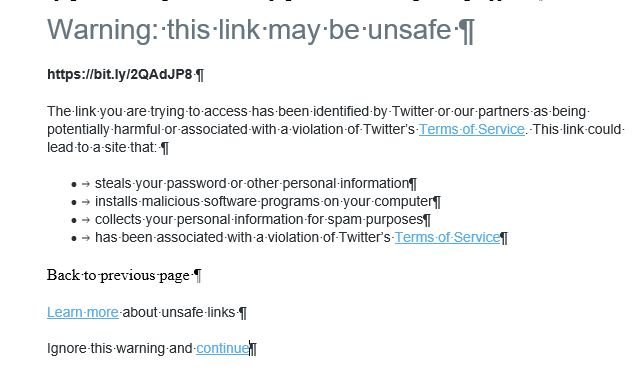First, the Twitter company went on a rampage banning Twitter posts and people from the social media platform, largely targeting tweets and people who do not fall in line with ideas pushed by the United States government and US mainstream media. Now, Twitter is using extreme scare tactics to try to stop people from even opening links placed on Twitter to web pages that contain such alternative views. Included are links to web pages containing information about a very important matter — coronavirus.
Many people are seeking out a variety of information regarding coronavirus to help them make decisions in the best interest of their health and to determine for themselves what government policies related to coronavirus are and are not warranted.
Recently Medium removed from its website an article by Aaron Ginn concerning coronavirus. The article is not in line with the communication being pushed by the US government and US mainstream media about the matter. The article may still be read at ZeroHedge.
By the way, ZeroHedge is one of the media websites that has been banned from posting at Twitter. In fact, the ban on ZeroHedge happened after it posted an earlier article regarding coronavirus.
Try to reach Ginn’s article through a Twitter post such as this one by clicking on the link to the article’s page at ZeroHedge and a Twitter page with this alarming message appears:

On Twitter’s warning page, the “Back to previous page” choice is set off on a big button. It seems obvious that pushing this button is the choice Twitter is encouraging people to make. Plus, when people read the message, they are led to believe they run the risk of identity theft, destruction of their computer and their information on it, and increased subjection to spam if they click through to the article about coronavirus.
Yet, Twitter should know whether it thinks the article poses some or all of these threats listed in the first three bullet points of its warning web page or if, instead, the article just “has been associated with a violation of Twitter’s Terms of Service” as noted in the final bullet point. It seems that Twitter lists all four bullet points anyways as a means to manipulate people to choose not to access the article because of the warnings of immense danger, no matter it those warnings are justified or not.
Many people who would be very wary of opening a web page that could cause the harm threatened in the first three bullet points would care less if Twitter disapproves of the linked article’s content. Indeed, for some people, the fact that Twitter disapproves of the article provides more reason to check the article out.
Reprinted with permission from the Ron Paul Institute for Peace and Prosperity.